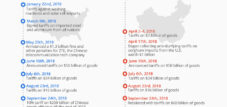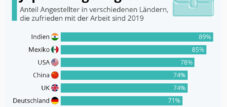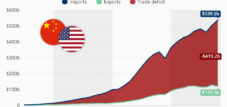Published on: April 3, 2025 / update from: April 3, 2025 - Author: Konrad Wolfenstein

China, Japan and South Korea: Joint response to US tariffs and strengthening regional economic cooperation-creative image: Xpert.digital
Commercial transition in Asia: China, Japan and South Korea pull together
The three largest economic powers in East Asia, China, Japan and South Korea, have agreed on a common strategy after years of reserved cooperation in order to react to the increasingly protected trade policy of the United States under President Donald Trump. The first trilateral economic discussion in five years marks a significant turn in regional economic relationships and could have far -reaching effects on global trade currents.
The historical meeting of the three business powers
At the end of March 2025, the Minister of Commerce China, Japan and South Korea in Beijing met for their first trilateral economic dialogue since 2020. At this meeting Wang Wentao (China), Yoji Muto (Japan) and Ahn Duk Geun (South Korea) agreed to a coordinated answer to the US customs policy. This meeting is a significant moment, since it was the first economic policy discussion of this kind between the three countries in five years.
The three neighboring countries, the relationships of which are historically contaminated by territorial disputes and political tensions, found a pragmatic path to cooperation in the face of the common economic threat from US tariffs. The vote takes place just a few days before Donald Trump, in which further punitive tariffs were to be presented. The US President had already referred to this day as a “day of liberation” and thus confirmed his intention to fundamentally redesign the existing trade relationships of the United States.
In a joint statement, the three ministers emphasized their obligation to work “closely together for comprehensive and high -ranking” negotiations on a common free trade agreement between their countries. The declared goal is to promote regional and global trade under increasingly difficult geopolitical conditions.
Suitable for:
Concrete fields of cooperation and agreements
The trilateral cooperation focuses on several concrete areas that are of strategic importance for all three economies:
Halver conductor trade and technology cooperation
A central aspect of the agreement concerns the semiconductor industry, a key sector for all three countries. Japan and South Korea are planning to move more semi -conductor raw materials from China, while China has signaled interest in the import of finished chip products from both countries. This agreement could represent a significant shift in the regional technology supply chains and strengthen the resistance of this strategically important industry.
The cooperation in the semiconductor area is particularly noteworthy in view of the fact that both Japan and South Korea are close political allies in the United States and are urged by Washington to join his strategy of the economic containment of China. The three Asian neighbors apparently try to find their own way that protects their economic interests without compromising their respective geopolitical positions.
Strengthening the supply chains and export controls
Another focus of the agreement is to strengthen regional supply chains. The three countries have agreed on closer cooperation in supply chains and plan to intensify the exchange about export controls. These measures aim to improve the resilience of their economies towards external shocks such as trade -political conflicts.
After the meeting, the South Korean President emphasized that they wanted to "build a transparent and predictable environment for trade and the supply chains". This statement, although vaguely formulates, represents a clear counterpoint on current US politics, which tries to isolate China internationally and to focus more on the high-tech chains on the United States.
The threat from US tariffs and their economic effects
Trump's aggressive customs policy
The new cooperation between the three Asian economic powers is primarily motivated by the aggressive customs policy of the Trump administration. Since January 2025, the United States has proposed tariffs from up to 25 percent compared to important trading partners such as Canada and Mexico and at the same time increased the tariffs to steel and aluminum imports from all countries to 25 percent.
The customs set of 25 percent announced by Trump is particularly drastic on the import of motor vehicles and motor vehicle parts, which is to be charged from April 2, 2025. "If you build your car in the United States, there is no customs," said the US President, making it clear that he wants to strengthen the United States as a production location with the tariffs and reduce trade deficits.
In addition, Washington has drastically increased the tariffs to Chinese imports from around 20 to 40 percent in the past two months and has announced another inch of 25 percent to imports from countries, which are relating to large amounts of Venezuelan oil, including China.
Economic consequences of the trade voltages
The effects of this customs policy could be significant. For Germany, which can serve as an example of an export-oriented economy, the US market accounts for a fifth of its entire global exports and a quarter of its global auto exports. Simulations indicate that a transatlantic customs conflict could halve the EU exports to the United States and that Germany's gross domestic product could be shrinked by around 0.33 percent in the long term.
Uncertainty can also be felt on the Asian financial markets. Although the Asian stock markets recently recorded a slight recovery, the voltage continues to dampen the market mood with regard to the upcoming US import duties. According to the Landesbank Baden-Württemberg, the inconsistency of political decisions in the United States ensures concerns about possible disorders of the supply chains and price increases for US consumers.
Suitable for:
- Capital injection for Chinese banks: An analysis in the context of customs disputes and economic challenges
Historical context and future prospects of trilateral cooperation
History of trilateral cooperation
The current intensification of cooperation between China, Japan and South Korea is in a longer tradition of trilateral cooperation in East Asia. As early as 2011, the heads of state and government of the three countries agreed to conclude a trilateral investment protection agreement and the admission of negotiations on a free trade agreement. In the same year, a secretariat to coordinate trilateral cooperation was opened in Seoul.
The first cooperation efforts were triggered by the Asian crisis in 1997/98, which made stronger economic policy cooperation necessary. Regular meetings have taken place since the Asian financial crisis to minimize geopolitical risks, but have been suspended against China for years in the recent past as a result of the Corona crisis and the US Commercial War.
Potential and challenges for the future
The three countries are already responsible for around 20 percent of global added value and could rise to the largest economic area in the world by 2020. A trilateral free trade agreement would additionally accelerate this development and could form a counterweight to the Protectionist policy of the United States.
However, the challenges for in -depth cooperation remain. The relationships between the three countries are still contaminated by territorial disputes and other conflicts, such as the controversial initiation of the prepared cooling water from the destroyed Fukushima nuclear power plant through Japan. In addition, there are different opinions about the intensity of the cooperation, as the statement of the South Korean Ministry of Commerce shows, the reports about a joint reaction to US tariffs called “somewhat exaggerated”.
New regional alliances in a changed world trade order
The rapprochement between China, Japan and South Korea is part of a global trend for the formation of new trading alliances in response to the protectionist policy of the United States. In addition to the three Asian countries, there are also signs of a deepening of trade relationships between Canada and the EU.
In the intensification of regional free trade relationships, economic experts see a promising strategy to limit the economic damage from US tariffs. The German Institute for Economic Research (DIW) recommends the EU to diversify its exports by deepening its trade relationships with free trade partners and improving integration within the EU internal market. Simulations show that such an approach not only neutralize the economic damage of a customs conflict with the United States, but could also lead to noticeable GDP gains in the long term.
The pragmatically oriented cooperation between China, Japan and South Korea in a growing number of political fields could serve as the basis for further integration in northeast Asia - a region that has so far been lacking in effective multilateral structures. As Commerzbank chief economist Jörg Krämer emphasized compared to ZDF: "It is about saving as much as possible from free world trade so that the whole system does not go down the stream".
Pragmatism in times of protectionism
The new cooperation between China, Japan and South Korea shows that economic pragmatism can bridge political differences when common interests are at stake. In view of the increasing trade voltages with the United States, the three East Asian economic powers have found a way to deepen their economic cooperation despite their historical rivalries and to develop joint answers to the challenges of US protectionism.
The agreements on strengthening the supply chains, the expansion of the semiconductor trading and the resumption of negotiations on a trilateral free trade agreement signal a new phase of regional economic integration in East Asia. Whether this pragmatic cooperation exist in the long term and can bridge the existing political differences will depend significantly on how US trade policy develops under Trump and what economic advantages the three countries can draw from their increased cooperation.
Suitable for:
Your global marketing and business development partner
☑️ Our business language is English or German
☑️ NEW: Correspondence in your national language!
I would be happy to serve you and my team as a personal advisor.
You can contact me by filling out the contact form or simply call me on +49 89 89 674 804 (Munich) . My email address is: wolfenstein ∂ xpert.digital
I'm looking forward to our joint project.













